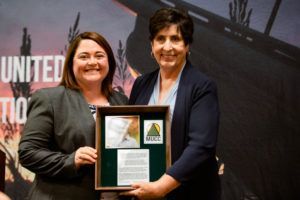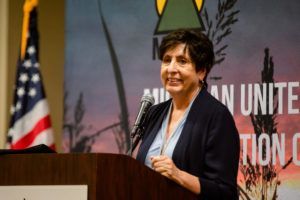Becky Humphries Inducted into MUCC Conservation Hall of Fame
Few legacies can impact the amount of people, organizations, species and habitats that Becky Humphries has.
Starting as an employee of the US Fish and Wildlife Service in the 1970s, she quickly transitioned to state wildlife work the Michigan Department of Natural Resources and grew through the ranks culminating in her being appointed Director of the Department of Natural Resources and then in 2010 of the newly-developed Department of Natural Resources and Environment, which combined the DNR and state’s environmental agency.
She was the first woman to hold either director role in Michigan.

Michigan United Conservation Clubs’ Executive Director, Amy Trotter, left, and CEO of National Wild Turkey Federation, Rebecca Humphries pose for a photo after Humphries’ induction into MUCC’s Hall of Fame during the 2022 MUCC conservation awards banquet on Saturday, June 25.
Humphries’ leadership saw the department through some of the most trying and uncertain times – including the discovery of Bovine Tuberculosis and chronic wasting disease in the state.
Moving the state through those challenging times and remaining steadfast in her approach to conservation and scientific management, Humphries was able to command the respect of a field so long dominated by men, said Amy Trotter, Michigan United Conservation Clubs executive director.
“There are few people in this state that have navigated the monumental challenges of working at the intersection of wildlife management and public policy so successfully as Becky,” Trotter said. “Her ability to command rooms with her eyes, bring together coalitions, focus on the task at hand and understanding that partnerships were a vital part to the department’s work is what helps her walk among legends like Genevieve Gillette, Bill Rustem and former Gov. Milliken.”
Humphries’ work with the DNR elevated her to leadership roles within Association of Fish and Wild Agencies. She not only won their two most prestigious awards for her work, but she was named chair of the Fish and Wild Health Committee and led the National Fish and Wildlife Health Initiative.

CEO of National Wild Turkey Federation, Rebecca Humphries, addresses the audience at Michigan United Conservation Club’s conservation awards banquet after being inducted into MUCC’s Hall of Fame on Saturday, June 25.
After more than 30 years with the DNR, Humphries left in 2011 to join Ducks Unlimited as the director of conservation partnerships. Dr. Karen Waldrop, Ducks Unlimited chief conservation officer, said, “Becky’s devotion to all things wild was evident in how she led people every day at Ducks Unlimited. She was a relentless proponent of wetlands and waterfowl conservation and those who worked with her felt inspired to succeed. Nature is better today because of Becky.”
In 2013, Humphries joined the National Wild Turkey Federation as its chief conservation officer before being named chief executive officer in 2017.
In 2022, Humphries announced her retirement from NWTF. Her daughter, Jenn Merchant, added this:
“I know that being inducted to the MUCC Conservation Hall of Fame is a special and well-deserved honor for my mom. Her dedication to conservation never stopped at the front door of our house, it permeated every facet of her life. She didn’t just participate in conservation, she lived it. Many of you saw the work that she did in the field, but I saw it at home every day. It inspired and continues to inspire me and many others to continue the legacy she has built. She has always been in my Hall of Fame and now I am happy to share her with yours.”
For these many reasons, it is with great honor that Michigan United Conservation Clubs recognizes Becky Humphries as a 2022 inductee into the Michigan Conservation Hall of Fame.
The post Becky Humphries Inducted into MUCC Conservation Hall of Fame appeared first on Michigan United Conservation Clubs.
Recent Posts



